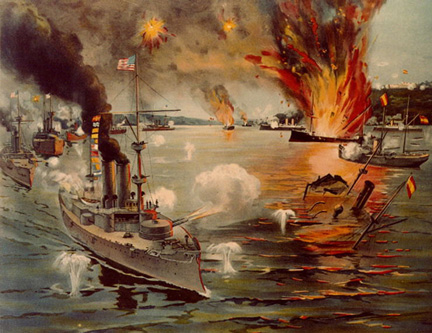|
Following successful completion of this lesson, students will be able to:
|
| Battle of Manila Bay | |||
|
|||
| Battle of Manila Bay, 1 May 1898 U.S. Naval Historical Center Photograph. Photo #: NH 91881-KN |
|||
| U.S.S. Olympia in battle at Manila Bay. |
Overview
Following expansionist efforts in Hawaii and Samoa, the U.S. turned its eyes to a nation closer to home-Cuba. The Cuban island was a logical imperialist choice for the United States- its people were in open rebellion against Spanish rule, the Spanish navy was weak, and a defeat of Spain opened the possibility for several new territories. Aiding the choice was the fact that the American people were largely supportive of a war with Spain. Over the years hostility towards Spain steadily increased as Americans were persuaded by yellow journalist accounts of Spanish abuses of the Cuban people. However, the final push for war came after the sudden explosion of the U.S.S. Maine in Havana Harbor in early 1898. After a hasty investigation, blame for the explosion was assigned to Spain. Cries of "Remember the Maine!" were heard across the country as Americans lobbied lawmakers retaliate against Spain. Shortly thereafter, in April 1898, the United States declared war on Spain thereby beginning the Spanish-American War.
Though Cuban events drew the United States into war, U.S. military efforts were not confined to the island. American military forces took advantage of the opportunity and attacked other Spanish held territories including the Philippines, Puerto Rico, and Guam. After a mere four months at war, U.S. forces had soundly defeated the Spanish. The terms of the Treaty of Paris were generous to the United States. Under the treaty the United States gained control over the Philippines, Guam, and Puerto Rico; Cuba gained independence (but with the U.S. as a protectorate), and Spain received 20 million dollars for their losses. Perhaps just as importantly, the Spanish-American War elevated the United States as an international military power; one that would be called upon to lead future war efforts in World War I and World War II.
